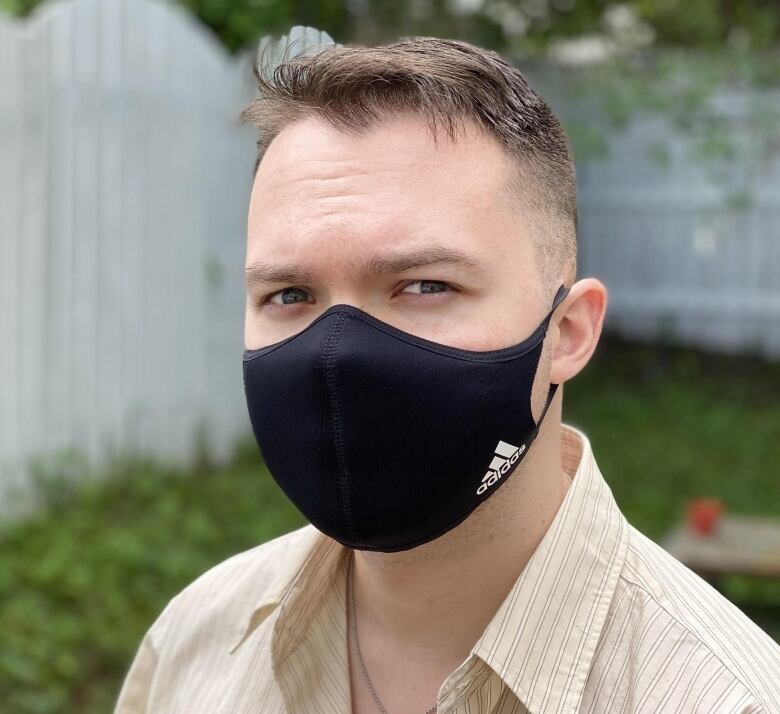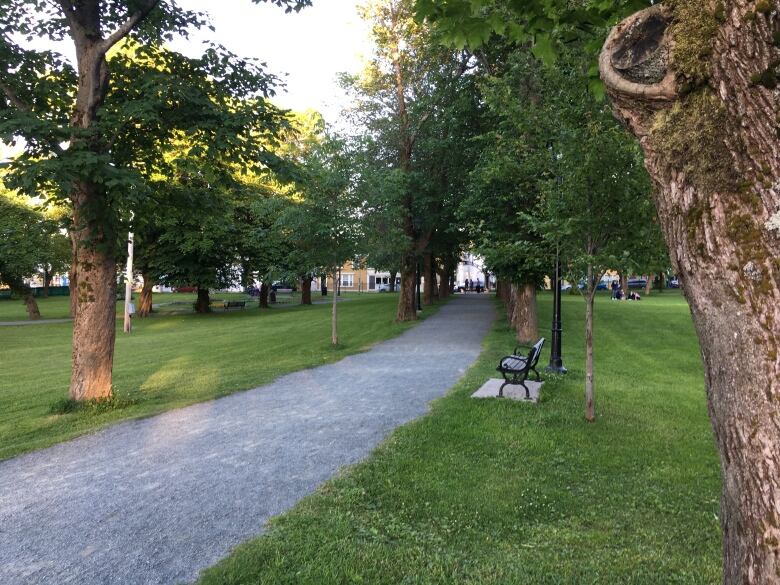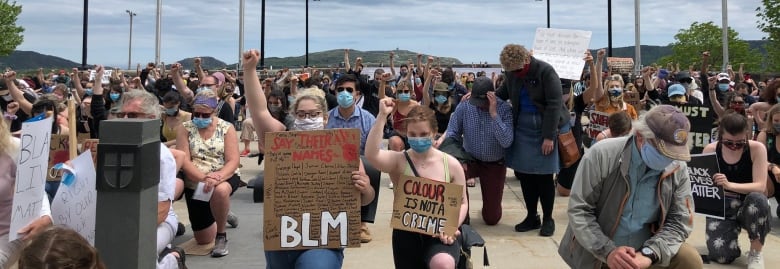It's important to unmask racism, and connect with those hurt most by toxic talk
'This might be new for you, but this is normal for me'

"I didn't know Adidas sponsors the way of the ninja," a man in the Winners lineup says as my girlfriend and I join the lineup to go inside.
A., my partner, and I are both wearing Adidas face masks, doing our part to help flatten the curve.
I look to A. after the man says this, and wonder just what he means. Perhaps it had been intended as a light-hearted joke, but his tone had been contemptuous, not comedic. Looking into A.'s eyes, I wonder: "Is this a race thing?"
A. is visibly Chinese. Even with her mask on, you can see her ethnicity in the shape of her eyes, one that signifies to a white public as "some variety of Asian." I too have Asian heritage my grandfather was Chinese and immigrated to Newfoundland in the 1930s but enough generations have now passed by that you would likely never guess my racial heritage from looking at me. I largely consider myself white-passing.
I ask him. "What does that mean?"
The man then looks at me and, imitating an Asian accent, says, "Oh, you wouldn't understand, it take many years to understand the way of the ninja."
So the man's remarks are indeed race-related. I feel outraged. My hands shake, and my stomach feels like it's on fire. I had never experienced anything like this before, such blatant racism in public.
This might be new for you," she says regarding the man's racist remarks, "but this is normal for me.- William Ping
"What exactly do you mean by 'the way of the ninja'?" I ask again, my voice wavering, uncertain where the situation is headed.
"The virus is fake and you look ridiculous," the man says, dismissing the two of us with a wave of his hand.
"We only wear the mask to protect people like you," I reply, my voice still wavering, his ignorance rattling my emotional resolve.
"My uncle lives in New York," the man says. "He got the virus and was hospitalized and put on a ventilator and he took hydroxychloroquine and was cured in 12 hours." [He's not the only person to make this claim; it's been the basis of a hoax that has spread online.]
At this point I also realize I had not only met this man before, I had had a similar discussion with him. Earlier in June, my girlfriend and I had sat down in Bannerman Park when he approached us. "Hydroxychloroquine is the cure," he told us.
"Oh yeah?" I said then, trying to end the conversation by appeasing his beliefs.
"Yeah," he said. "Once all of these idiots figure that out, we can open the province back up."
"That's so true," I said out loud, although I was thinking, "that's so false." I was just agreeing with the man so that he would leave us alone and move on. And he did move on; my partner and I watched as he stopped to talk to everybody he saw, presumably telling them about hydroxychloroquine, a drug that the FDA has warned can cause "serious heart-related adverse events and death in patients with COVID-19."
Making a stand
Here, outside Winners, I decide to do what I hadn't done the first time I met this man: I challenge him on his beliefs about hydroxychloroquine. We continue to argue in the lineup until he is admitted into the store. I won't dignify the details of the argument, as I do not care to give any sort of platform to the man's toxic beliefs.
After the argument is over, I am shaken, angered and saddened by the man's racism, and his ignorance about the pandemic.
Interestingly, my partner is not so shaken.
"This might be new for you," she says regarding the man's racist remarks, "but this is normal for me."
I have known this to be true since we've been together. There are numerous, small, daily instances (waiters slowing down their speech while talking to her) where my partner's racial difference from our majority-white community becomes acknowledged in a way that I have never experienced myself.
While I might be of Asian descent, my white skin has given me a world of privileges beyond what I had even known before I met her.
We can see that same white privilege in the man's ignorant rhetoric, and also in his thoughts on masks.

The mask protects not the wearer, but those around the wearer. A mask is a sign of courtesy, a sign of thoughtfulness and respect for anyone you might interact with. The man's anti-mask stance is yet another sign of his privilege, of his unwillingness to think of those beyond himself.
I was engaging in a certain kind of sickly privilege the first time I met the man, when I agreed with him so he would go away. After reflecting, I feel guilty, as though I enabled him the first time I met him.
After I agreed with him, he felt emboldened to continue to deliver his message to other people in the park. I would imagine that others also agreed with him, regardless of their actual opinion, just so he would leave them alone.
But in agreeing with ignorance when we see it, we only embolden the ignorant to continue in their wrongheaded ways, to steel their dangerous beliefs through coerced assent, to become more and more ignorant, to feel more and more entitled to provoke complete strangers with their racist remarks.
It's easy to say "we need to confront ignorance when we see it. We need to stand up and say something," but how do we do this when we are in the heat of the moment, in these incidents that feel truly unreal as they unfold?
There was an absolute silence surrounding the argument. Our fellow patrons in the lineup stood silently, shifting in their flip-flops, looking at their phones, while store employees avoided attempts at eye contact perhaps even used to these types of interactions.
When social media can feel hollow
I was inspired at the local Black Lives Matters protest to see so many Newfoundlanders who came out to protest systemic racism and white supremacy. And it's been heartening to see the steady amounts of social media posts about the BLM movement, posts which keep the ideas and goals of the movement fresh in our minds.
These social media posts are useful, but they can feel hollow and empty when they serve as a substitute to standing up to instances of public injustice when you see them.

White supremacy isn't just cross burning and senseless violence, it's also the ability to feel like you can call Asian people "ninjas," to hold them emotionally hostage on a nice day in the park or in line to go shopping, or do wherever you feel as though you deserve to put others down.
When my partner says this is "normal" for her, we have to understand that this is merely one small example of the "normal" prejudice and discrimination that BIPOC [Black, Indigenous, people of colour] face constantly.
In fact, this "ninja" incident is a relatively benign example of the millions of indignities, both small and large, that BIPOC face every day, even here in Newfoundland and Labrador, where many people like to believe that racism does not exist in the same way it does in other places.
It is our collective responsibility to learn about racial inequalities and prejudices. It is no longer a valid excuse to simply "not know."
This is something we are all learning about ourselves and one another in this moment, myself included.
Racism does exist in Newfoundland and Labrador. We owe it to ourselves to confront it when we see it.
Ninjas are known to be quiet, and maybe I look like one when I wear a mask, but we should never be quiet in the face of racism and ignorance of any kind.












_(720p).jpg)


 OFFICIAL HD MUSIC VIDEO.jpg)
.jpg)



























































































